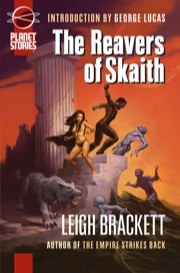
The Reavers of Skaith, published by Paizo, written by Leigh Brackett, is the third book in a series following The Ginger Star and The Hounds of Skaith. Below I'll be discussing some ideas that floated through my brain as I read it. This includes spoilers so if you insist on knowing nothing of the book, do not read on.
First off, the cover. Here, Eric John Stark is fighting off Children of the Sea. These are people who in the long ago past were changed at a genetic level so that they should thrive under the waters.
When looking at the origins of the races in your campaign, what if you throw a touch of some of the old school in there. In several campaigns that span the earliest time of the RPG origins, the past was not always one of swords and spells. Both Blackmoor and the Wilderlands, as well as Arduin and even parts of Greyhawk, have their nods to technology in one form or another.
In 4e, this would almost make more sense. Suppose that Dragonborn and Tielflings are NOT the results of devilish bargains and dragons making martial guardians. Suppose instead they have one common origin and were supposed to guard the land against all others and the other races were put into place as servants and guides for their perspective duties. Most would say that elves, still being elves, still being known for their forest lore, have succeeded. Ditto for dwarves and perhaps even plausible for halflings. But Tielflings and Dragonborn who've never had a strong root in gaming history?
In the core of 4e background, they each had a mighty empire and both were destroyed in a clash. What if that mighty empire's origin lies in genetic engineering and super science? What if they were one empire at a time until a race divide seperated the two and eventually lead to war? It provides a lot of opportunities to expalin with genetic engineering some of the strange races and monsters in the game as opposed to merely hand waving everything away as magic or some crazy deity.
The other thing that comes clear from The Reavers of Skaith is the powerful place of religion. There are several different sects with various followers here. Many of them with fanatics willing to die for the cause. If the Game Master can impress upon the players the importance of religion, not necessarily to the characters, but to certain factions within the campaign, it can act as a guide for what to expect if those factions ever come into conflict with the players.
For example, there are several instances here where the fantatics fight to the death. In the real world, even with all the advanced secruity and technology we have, unfortunately, we've learned the power of a man determined to die who has explosives with him. The point being it's hard to reason with someone whose already determined that if they're going to die, they're taking you with them.
Lastly, there is Halk. A broad shouldered swordsman who wishes to kill Eric John Stark, but keeps finding reasons not to. If the players do a good job at their various duties, if they treat the NPC's with respect, if they work out their differences, show that it has an effect on the game by changing the way that the Non-Player Characters react to them. At times the reader isn't sure if Halk is going to go for that vengance, but at the end with the characters have their last verbal confrontation, we know that Stark has Halk's grudging admiration.
Keep in mind the various points of origin of your world. Keep the role of religion and the various things it can make a man do in mind. Keep in mind that the players can effect real change in the campaign and have the world react to it.





I am currently working on a setting that very much mingles the concepts of fantastic origins and evolution in the form of a fantasy world.
ReplyDeletePerceptions, motivations, and national origins have very much played a part in my mai ncamapgin in the past. One empire was fear and reviled by the others because it was seen as an imperialist nation with agression on its mind when in reality they were the only ones who could see an impending apocalypse and were working toward preparing for that day.
Religion is often an under utilized element in games, and a lot of fiction too, for than matter, when compared to the rich source of conflict and motivation it was in real history.
ReplyDeleteToo often these days, its just a little window-dressing, or a source of powers.
Agreed!
ReplyDelete"Cool, my god is a beast god so I can turn into a bear!" - Not to mention having to perform rather savage rights and sacrifices and living up to that bestial expectation.
"Really? Mine is a War God so I get +1 to hit every third level!" - Along with having to sew the seeds of conflict and agression wherever you go and never being able to be back down from a fight.
These are just off the cuff examples, but we've all seen it where the other elements of a character's chosen god get tossed out the window once the player reaps a sweet bonus from his following.
One of the great thing about the Crown of Stars series by Kate Elliot is how a 'heresy' became a huge point of the series through organic happenings in the story as opposed to being some huge main character driven thing.
ReplyDelete